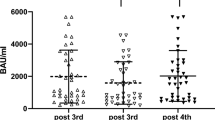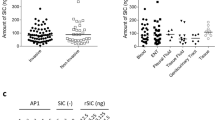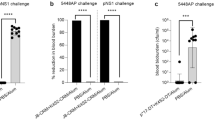Abstract
FAILURE of antibody to appear in the serum following large doses of antigen has been reported under varying sets of conditions. In normal adult mice, a life-long state of ‘immunological paralysis’ can be induced by the administration of a sufficient amount of pneumococcal polysaccharide.1 This antigen is known to persist for at least a year, and it may either continuously neutralize antibody as it is formed, or it may inhibit the actual synthesis of antibody.2 These alternatives may be used to explain the more temporary ‘immunological unresponsiveness’ inducible in adult rabbits with massive injections of purified proteins.3 However, when the same protein antigens are administered during fœtal or neonatal life, subsequent antibody formation is inhibited for longer periods.3,4 Apparently, the neonatal cells possess a different order of sensitivity to inhibition. It is not clear whether this inhibition is dependent upon the continuous presence of antigen; but there is a correlation between increasing dosage and prolongation of unresponsiveness.5
This is a preview of subscription content, access via your institution
Access options
Subscribe to this journal
Receive 51 print issues and online access
$199.00 per year
only $3.90 per issue
Buy this article
- Purchase on Springer Link
- Instant access to full article PDF
Prices may be subject to local taxes which are calculated during checkout
Similar content being viewed by others
References
Felton, L. D., J. Immunol., 61, 107 (1949).
Kaplan, M. H., Coons, A. H., and Deane, H. W., J. Exp. Med., 91, 15 (1950). Stark, O. K., J. Immunol., 74, 130 (1955). Dixon, F. J., Maurer, P. H., and Weigle, W. O., J. Immunol., 74, 188 (1955).
Dixon, F. J., and Maurer, P. H., J. Exp. Med., 101, 245 (1955).
Hanan, R., and Oyama, J., J. Immunol., 73, 49 (1954). Cinader, B., and Dubert, J. M., Brit. J. Exp. Pathol., 36, 515 (1955). Dubert, J. M., and Paraf, A., C. R. Acad. Sci., 244, 686 (1957).
Hasek, M., Proc. Roy. Soc., B, 146, 67 (1956). Smith, R. T., and Bridges, R. A., J. Exp. Med., 108, (1958). Tempelis, C. H., Wolfe, H. R. and Mueller, A. P., Brit. J. Exp. Pathol., 39, 328 (1958).
Boyden, S. V., J. Exp. Med., 93, 107 (1951).
Coons, A. H., Leduc, E. H., and Connolly, J. M., J. Exp. Med., 102, 49 (1955).
Author information
Authors and Affiliations
Rights and permissions
About this article
Cite this article
SERCARZ, E., COONS, A. Specific Inhibition of Antibody Formation During Immunological Paralysis and Unresponsiveness. Nature 184, 1080–1082 (1959). https://doi.org/10.1038/1841080a0
Issue Date:
DOI: https://doi.org/10.1038/1841080a0
This article is cited by
Comments
By submitting a comment you agree to abide by our Terms and Community Guidelines. If you find something abusive or that does not comply with our terms or guidelines please flag it as inappropriate.



